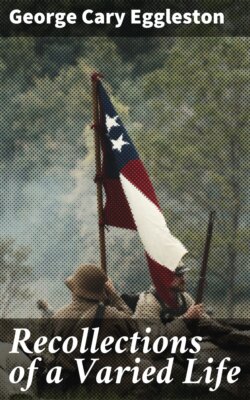Читать книгу Recollections of a Varied Life - George Cary Eggleston - Страница 18
На сайте Литреса книга снята с продажи.
XV
ОглавлениеTable of Contents
To return to the changes wrought in the West by the construction of railroads and the influx of immigration from all parts of the country. In nothing else was the improvement more rapid or more pronounced than in education. Until the early fifties, and even well into them, educational endeavors and educational methods were crude, unorganized, wasteful of effort, and utterly uncertain of result. From the very beginning the desire for education had been alert and eager in the West, and the readiness to spend money and effort in that behalf had been unstinted. But the means were lacking and system was lacking. More important still there was lack of any well-considered or fairly uniform conception of what education ought to aim at or achieve.
In the rural districts schools were sporadic and uncertain. When a "master" was available "school kept," and its chief activity was to teach the spelling of the English language. Incidentally it taught pupils to read and the more advanced ones—ten per cent. of all, perhaps, to write. As a matter of higher education rudimentary arithmetic had a place in the curriculum. Now and then a schoolmaster appeared who essayed other things in a desultory way but without results of any consequence. In the villages and towns the schools were usually better, but even there the lack of any well-ordered system was a blight.
School Methods
The schoolmasters were frequently changed, for one thing, each newcoming one bringing his own notions to bear upon problems that he was not destined to remain long enough to solve. Even in the more permanent schools, kept by very young or superannuated preachers, or by Irish schoolmasters who conducted them on the "knock down and drag out" system, there was no attempt to frame a scheme of education that should aim at well conceived results. In every such school there were two or three boys taking "the classical course," by which was meant that without the least question or consideration of their fitness to do so, they had dropped all ordinary school studies and were slowly plodding along in rudimentary Latin, in obedience to some inherited belief on the part of their parents that education consists in studying Latin, that there is a benediction in a paradigm, and that fitness for life's struggle is most certainly achieved by the reading of "Historia Sacra," "Cornelius Nepos," and the early chapters of "Cæsar's Commentaries on the Gallic War."
Other pupils, under the impression that they were taking a "scientific course," were drilled in Comstock's Physiology and Natural Philosophy, and somebody's "Geography of the Heavens." The rest of the school—plebeians all—contented themselves with reading, writing, arithmetic, geography, and a vain attempt to master the mysteries and mists of Kirkham's Grammar.
The railroads quickly changed all this. They brought into the West men and women who knew who Horace Mann was, and whose conceptions of education in its aims and methods were definite, well ordered, and aggressive.
These set to work to organize graded school systems in the larger towns, and the thing was contagious, in a region where every little town was confidently ambitious of presently becoming the most important city in the state, and did not intend in the meantime to permit any other to outdo it in the frills and furbelows of largeness.
With preparatory education thus organized and systematized, and with easy communication daily becoming easier, the ambition of young men to attend colleges and universities was more and more gratified, so that within a very few years the higher education—so far as it is represented by college courses—became common throughout the country, while for those who could not achieve that, or were not minded to do so, the teaching of the schools was adapted, as it never had been before, to the purpose of real, even if meager education.
Even in the remotest country districts a new impetus was given to education, and the subjection of the schools there to the supervision of school boards and professional superintendents worked wonders of reformation. For one thing the school boards required those who wished to serve as teachers to pass rigid examinations in test of their fitness, so that it was no longer the privilege of any ignoramus who happened to be out of a job to "keep school." In addition to this the school boards prescribed and regulated the courses of study, the classification of pupils, and the choice of text-books, even in country districts where graded schools were not to be thought of, and this supervision gave a new and larger meaning to school training in the country.
